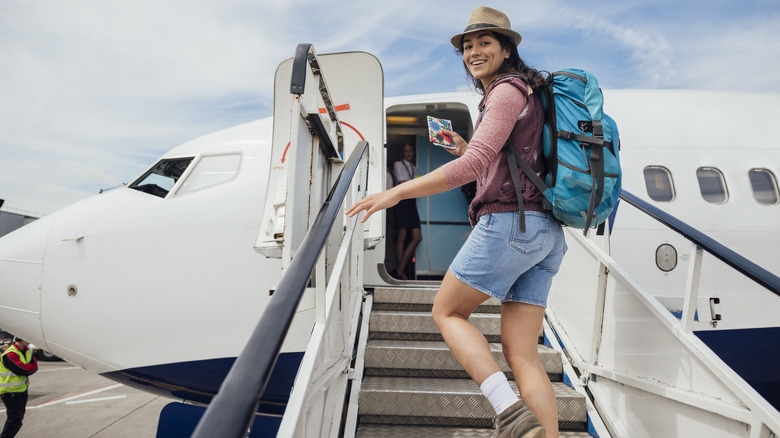Never Book A Flight On These Days Of The Week For A Costly Reason
Whether you're jet-setting across the ocean, flying out for a weekend away, or embarking on a cross-country flight, there's one thing most travelers can agree on: air travel has gotten way too expensive. In fact, according to a 2023 report by the Federal Reserve Economic Data (FRED), flight prices spiked nearly 25% — the largest spike since 1989. From extra baggage fees to seat selection and "priority boarding" charges, it seems like airlines are trying to milk every single penny out of unsuspecting travelers who just want to take a break and hit the skies. However, there are still a few tricks left up travelers' sleeves to navigate cutting back on costs.
In an exclusive interview, Explore spoke with Andy Knowles — luxury travel advisor and owner of Travel Agent Andy — to understand exactly what makes some flights more expensive than others and how you might avoid overpaying for your trip. From choosing the right date to tracking flight prices and researching your destination well, here's what Andy had to say about making your money go further when booking your flights.
What's the deal with flight prices
The thing about flight prices is that there's no one-size-fits-all answer as to why some of them can be so incredibly expensive. However, in most cases, it all depends on the good ole principle of supply and demand. "All airlines use dynamic pricing, which means that they will increase/decrease their rates based on demand," says Andy.
In other words, traveling on the weekend and during holidays means that prices tend to skyrocket because more people are looking for and buying flights for those days. "Generally speaking, traveling anywhere for a long weekend (Thursday to Sunday) is going to have the most expensive rates because they're the most demanded," he explained.
In addition to this, traveling to certain destinations during a specific season also means you'll have to pay a little more — even if you're catching a flight in the middle of the week. "For example, if you travel to Costa Rica during their dry season (December-April), you'll be paying more for flights and hotels than you would during the rainy season (May-November) because there's a higher demand for better weather," said Andy. All of which goes to say, if you want to save some money, make sure you look into your destination, figure out the difference between high and low season, and decide whether you're willing to trade up a little sunshine for the price difference.
How to ensure you're getting a good deal
If you absolutely need to travel on a specific date, getting a better deal on your flights ultimately depends on how well you're willing to plan ahead. Per Andy's advice, "I typically recommend booking international flights two to four months ahead of travels, and one to three months out for domestic flights (during non-holiday travel seasons)." That way, you won't just be saving money on your tickets, but you'll also have a wider selection of flight options available to choose from.
In addition to this, Andy also suggests making the most of tools like Google Flights to keep a close eye on how prices fluctuate before your trip. "Typically when you're looking at flight prices there, it will show if the rates are more or less expensive than typical and will allow you to "follow" the rates," he explains. "Whenever flight prices decrease, they will send you an email notification letting you know when it's the best time to book."
And if planning isn't your thing, why not work with someone like Andy to take care of it for you? Armed with years of experience and industry insights, using a travel agent can help streamline your travel planning process to make it more stress-free and efficient. Plus, most licensed agents also work directly with hotels and airlines to ensure you're getting the best deal possible — with a few perks thrown in there for good measure.


